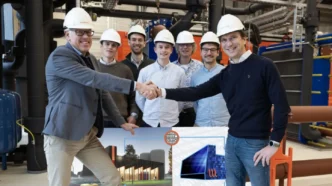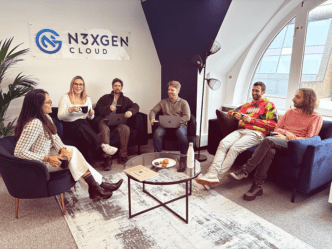Heating and cooling systems account for nearly half of the world’s final energy use, and Dutch climate tech startup Gradyent is on a mission to make them cleaner and more efficient. The Rotterdam-based company has just secured €28 million in fresh funding to expand its AI-powered Digital Twin platform—technology designed to cut CO₂ emissions by up to 10% and reduce both operational and capital expenses for energy providers.
The oversubscribed funding round was led by impact investor Blue Earth Capital. It also attracted new backer SEB Greentech Venture Capital and returning investors Capricorn Partners, Eneco Ventures, Helen Ventures, and Energiiq. With this latest raise, Gradyent has now brought in over €39 million since launching in 2019.
The new capital will help the company enhance its platform, expand globally, and grow its team as it aims to transform how heating and cooling grids operate across cities and industrial facilities.
Revolutionising District Heating with AI and Digital Twin Technology
Founded by Hervé Huisman (formerly of ASML and McKinsey), Robert Vrancken, and Freek Smelt, Gradyent develops advanced AI solutions to modernize aging heating systems. Traditional software can’t keep up with the rising complexity of today’s multi-energy grids. That’s where Gradyent’s AI-powered Digital Twin comes in.
This platform creates a real-time digital replica of a city’s entire heating or cooling network. By combining sensor data, weather forecasts, geographical information, and physics-based modeling, it allows energy providers to simulate, optimise, and manage energy distribution with precision.
With this digital layer, operators can make better decisions, reduce heat loss, lower emissions, and boost the performance of their energy systems—all while keeping costs in check.
Reducing CO₂ Emissions Across Europe: Case Studies in Action
Gradyent’s technology is already being used by major energy companies in over 35 European cities. In Helsinki, energy giant Helen leveraged the platform to reduce heat losses and improve demand management. Insights from Gradyent’s offline analysis even enabled Helen to shut down one of its coal plants—cutting CO₂ emissions from the city’s heat production by up to 40%.
In Poland, Gradyent is working with Veolia to optimise heating operations in Łódź and Poznań. Their solution blends weather forecasts, heat demand, and real-time electricity pricing to help Veolia shift toward 4th-generation (4G) district heating—a more sustainable model for the future.
Meanwhile in the Netherlands, Gradyent is partnering with Uniper to enhance district heating through lower operating temperatures, resulting in reduced heat loss without sacrificing supply reliability.
The company has also entered the industrial sector through a pilot project with Shell at its Energy and Chemicals Park in Rotterdam. By deploying a Digital Twin for Shell’s steam grid, the collaboration supports the oil giant’s roadmap toward achieving net-zero Scope 1 and 2 emissions by 2050.
Positioned for Global Expansion Amid Growing Energy Demand
As the global energy landscape shifts, the need for flexible assets like electric boilers and heat pumps is surging. By 2030, demand for such technologies is expected to grow tenfold. Gradyent plans to meet that need by expanding beyond Europe and deepening its industrial focus.
The company’s AI platform is especially valuable in today’s volatile energy market, where optimizing for cost, emissions, and performance is more complex than ever.
“Gradyent is driving a much-needed transformation in how we heat our cities and industries,” said Hervé Huisman, Gradyent’s CEO. “By connecting various energy sources and enabling real-time optimisation, we give companies the tools to reduce emissions and make smarter decisions every day.”
Investors agree. Claude Kamga of Blue Earth Capital highlighted the company’s potential to accelerate global decarbonisation, while Mikko Huumo of SEB Greentech VC noted that Gradyent’s uniquely timed solution is helping energy firms navigate the shift to affordable, low-carbon heating.













